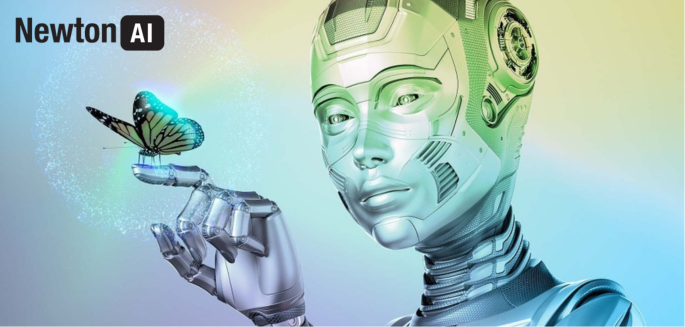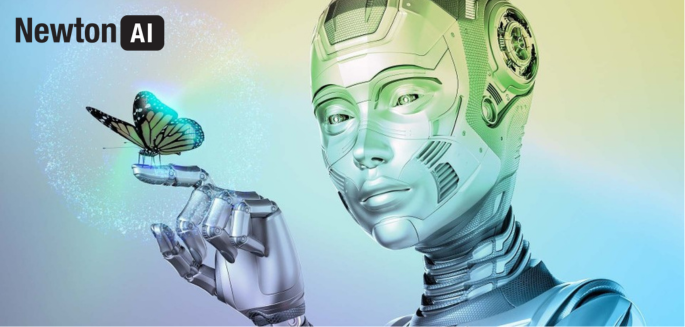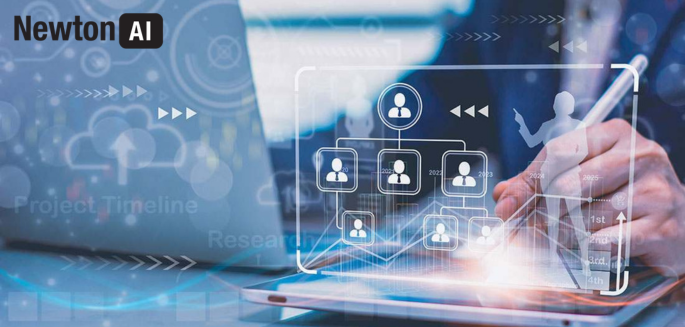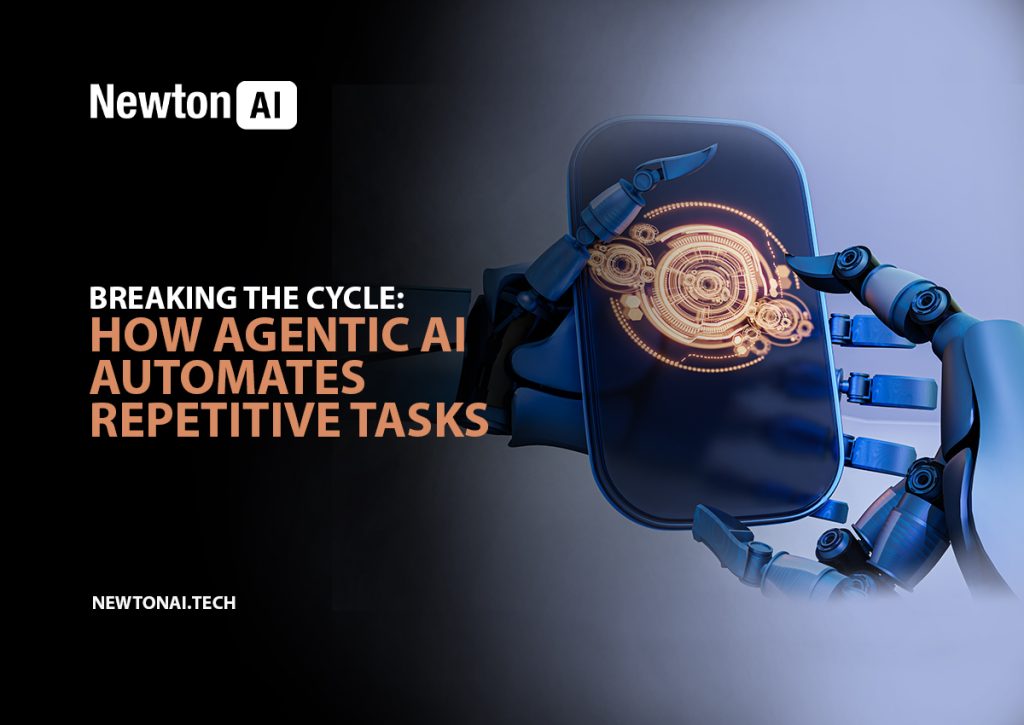While it was earlier about very boring day-to-day administrative jobs, it has evolved into something really fascinating-a complex workflow. This blog dives into how Agentic AI in Automation is a smart solution for repetitive tasks, benefits of Agentic AI in Automation, and how Autonomous AI Systems are going to influence the future of work. There is also para on one of the innovation leaders in this space, Newton AI Tech, a company rewriting the rules in intelligent automation.
With time as money and efficiency being the driving growth engine, companies from all verticals strive towards intelligent solutions for process optimization-all of these lead to one of the most revolutionary developments in this direction: Agentic AI, the latest evolution in artificial intelligence, bringing autonomy, decision-making ability, and contextual understanding to automated systems.

What Is Agentic AI in Automation?
Agentic AI stands for artificial intelligence system which claims autonomy and goal-directed action, meaning it decides, plans, and executes activities with minimal human intervention. When looked at under the perspectives of automation, agentic AI becomes a paradigm shift from the traditional rule-based or reactive techniques, letting the machines act as “agents” that can adjust, learn and act independently within a swiftly changing environment.
Core Characteristics of Agentic AI
When agentic AI acts, it sets its own goals, creates strategies, and has the ability to learn from its interactions. These systems often integrate cognitive architectures that provide them with the computational abilities to reason, weighing the costs of actions against their possible benefits to prioritize actions, evaluate results from prior actions, and update their behaviours accordingly. Key characteristics include:
-
- Autonomy: Agentic systems operate without constant human guidance, making decisions based on environmental inputs and long-term objectives.
-
- Pro-activeness: Instead of waiting for commands, agentic AI identifies opportunities or issues and takes initiative.
-
- Context-awareness: These systems understand and interpret context, enabling more accurate and situational responses.
-
- Learning and adaptation: Agentic AI continuously improves by learning from experiences, refining its approach over time.
Applications in Automation
In industrial and business automation, agentic AI plays a transformative role:
-
- Smart Manufacturing: Agentic robots in factories can detect faults, reconfigure tasks, and optimize workflows without halting production or needing manual input.
-
- Autonomous Vehicles: These systems make real-time driving decisions, from navigation to hazard avoidance, acting as fully independent agents.
-
- Intelligent Process Automation (IPA): In office environments, agentic AI can handle complex workflows like customer service queries, document processing, or financial auditing by making contextual decisions instead of following static scripts.
-
- Supply Chain Management: Agentic AI predicts disruptions, reroutes logistics, and manages inventories autonomously based on shifting market conditions.
Advantages and Challenges
Agentic AI improves all the areas by having enough resource available to improve efficiency, improve accuracy, and recognize the importance of responsiveness to the field. Minimal supervision or oversight is necessary; therefore, this will pave the way too much more scalable, intelligent automation. However, there are still some challenges related to them that one can cite, such as ensuring ethical behavior, handling unpredictability, and maintaining the transparency of decision-making processes.

The Evolution of Agentic AI in Automation
Agentic AI improves all the areas by having enough resource available to improve efficiency, improve accuracy, and recognize the importance of responsiveness to the field. Minimal supervision or oversight is necessary; therefore, this will pave the way too much more scalable, intelligent automation. However, there are still some challenges related to them that one can cite, such as ensuring ethical behaviour, handling unpredictability, and maintaining the transparency of decision-making processes.
Early Automation: The Foundations
Just to give an example of how agentic AI has reshaped automation, earlier it was barely beyond the dimensions of scripted programming. Machines followed what you told them; now, there are intelligent machines who decide, formulate goals, and execute autonomously-have the agency increasingly like a human.
Introduction of Traditional AI
With conventional AI, the next leap was that such machines could do things, process data, and categorize activities, and very little could decide for itself. The average condition these systems could adapt to was possible using algorithms such as decision trees; others would fail to recognize their environment or create their purposes. They were reactive and not proactive.
Rise of Machine Learning
Machine learning (ML) has marked a new important evolution. Systems started improving their efficiency through experience, taking that in consideration and having more data. Automation turned out to be smart-analyzing past outcomes and refining decision programs for the future. Most ML models, again, typically need human intervention during goal setting and development of strategy.
Agentic AI: The Autonomous Leap
Agentic AI extends beyond ML, and it is not only reactive. It is different because it pursues goals autonomously, generates its own objectives, plans multi-step actions, and dynamically adapts to changing environments. Based on cognitive science and decision theory, agentic AI brings true intelligence into automation.
Examples include:
-
- Autonomous robots that assess situations, reroute paths, and recover from errors in real-time.
-
- Digital agents like AI co-pilots that manage workflows, communicate with other systems, and make proactive suggestions.
-
- AI in logistics and manufacturing, where systems self-optimize production lines or reroute supply chains during disruptions.
The Present and Beyond
At present, agentic AI is incorporated from smart factories through self-driving cars to virtual assistants and even customer service bots. It is expected in future, with the evolution of such an AI, that it will become even more integrated; systems not only working for humans but also with them-alongside enhancing their decision-making and creativity with respect to productivity.

Benefits of Agentic AI in Automation
It is AI agents capable of modifying the nature of automation by assigning some goal-oriented intelligence to machines and systems. Differently from conventional automation systems that follow a prescriptive and almost static set of commands, agentic AI has the capacity to make independent choices about current operations, learn about the environment, and autonomously update their actions according to changing input conditions. This putative next level possesses a variety of advantages across all industries.
1. Enhanced Autonomy and Efficiency
One of the most distinct characteristics of agentic AI is that, in many cases, it can go about things on its own. In other words, these systems can set their own goals; carry them out with minimal or sometimes no human intervention; change tactics on the fly when required; and perhaps most importantly, solve problems without human intervention. For example, in manufacturing or logistics, using agentic AI in this regard would mean it is capable of detecting delays, rerouting supplies, and rescheduling tasks, particularly with consideration of maintaining productivity while reducing downtime.
2. Intelligent Decision-Making
Agentic AI does not just act, it reasons. It evaluates context, weighs options, and chooses action based on set outcomes. This translates into superior decision-making in any automated system, whether that be a robot operating in a warehouse or an AI assistant directing workflow management. Higher accuracy, decreases in errors, and better strategic outcomes become a natural effect of this.
3. Adaptability to Dynamic Environments
While standard automation systems are disrupted in unpredictable environments with rapidly changing conditions, agentic AI is here to its rescue. Whether it is adapting to changes in demand or supply chain disruptions or mechanical failures, in these situations, the systems shift decision-making dynamically, in real time. The flexibility provided through real-time change is extremely important, especially for industries like healthcare, defence, and transportation.
4. Reduced Human Workload
Through the automation of repetitive, complex, or high-stress tasks, agentic automation gives human workers more time for high-level decision-making, creativity, and innovation. In the office, AI agents handle data processing, scheduling, and reporting. On the factory floor, autonomous systems take the place of constant human monitoring.
5. Continuous Learning and Improvement
Agentic AI’s evolution is based on machine learning. Over the lifetime of the agentic AI, it learns from its successes and failures to improve its performance and adapt to new situations. This means that agentic systems become more effective the longer they run, leading to exponential efficiency and reliability gains.
6. Scalability and Cost Savings
Because agentic AI can tolerate the complexities of accomplishing its objectives with little supervision, organizations can scale operations without increasing manpower or infrastructure proportionally. Such growth drives costs down and profit margins up, thus making the companies competitive in a digital economy.
Use Cases of Agentic AI in Repetitive Task Automation
1. Customer Support
Highly engineered Agentic Customer Support software talking bots or virtual agents can take thousands of customers’ queries concurrently in silence. These systems understand the context of the questions, even emoting towards customer sentiments, and escalates issues when required automatically.
2. Data Entry and Processing
Agentic AI carries out thousands of repetitive data activities from updating a spreadsheet and migrating data from one platform to another while identifying anomalies and improving data quality.
3. Invoice and Expense Management
Agentic AI tools can analyze invoices, verify their validity, reconcile them with purchase orders, and trigger payments across finance departments-by themselves without any human intervention.
4. Supply Chain Automation
Agentic AI can manage the inventory automatically from the shipment as well as shipment tracking, demand forecasting and vendor communication for intelligently integrated and sparsely populated supply chains.
5. Marketing Automation
An AI agent can create, schedule and optimize a marketing campaign, respond to a customer voice, and analyze results for future optimizations.

Newton AI Tech: Pioneering the Future of Agentic AI
Just as many other aspects of development, AI is evolving, and so is its incorporation into agentic AI in automation among industrial revolutions across the globe. It is one such company at the forefront of this innovative revolution in automation through machine learning, robotics, and decision-making Newton AI Tech. The company is spearheading the future beyond automation into agentic AI.
What is Agentic AI?
The focus of Newton AI Tech is to achieve these advanced self-directed systems that aim to improve efficiency, cut down on human error, and operate across a wide spectrum of industries while looking over its shoulder.
Agentic AI refers to systems that do not merely perform actions but are endowed with goal-directed behavior and the power of volition. These systems are not merely linear in that they react under prescribed rules but rather are proactive in goal-setting, goal-pursuing, experiential learning, and contextual capacity for adaptation in the presence of dynamic elements. In stark contrast to traditional automation mechanisms, which carry out fixed and repetitive tasks, agentic AI systems are initiated by the user and can adapt without further human intervention to new challenges.
Key Contributions of Newton AI Tech
1. Autonomous Decision-Making and Adaptability
These agentic AI systems are equipped with algorithms well-advanced to enable real-time responsive decisions as the conditions change. This means for all that has to do with supply chain automation, autonomous vehicles, and even smart manufacturing; it can analyze large amounts of data, recognize patterns, and adapt operations on the fly.
For example, in the manufacturing sector, the AI robots would monitor the production line in real time, spot potential bottlenecks, and adapt the workflow; all without human intervention. In this manner, by minimizing downtime, it would improve productivity through optimizing resource and equipment usage.
2. Learning from Experience
One feature that Newton AI Tech surely boasts for its systems is their quality to learn and improve continuously from experience. For example, through machine learning techniques in reinforcement learning and neural networks, these agents will refine their decision-making processes over time. This is best applied to environments that continuously change, such as in autonomous driving and financial markets. In these types of applications, the most determining factor is real-time adaptability.
In logistics, for example, AI systems in Newton end up learning previous delivery routes, pertinent weather conditions, and lots of other traffic details, allowing future shipments to be optimized. Thus, its continuous improvement makes sure that these systems learn and become smarter and more efficient as they are operational for longer, accruing value over time.
3. Multi-Industry Applications
In addition to establishing its versatility and scalability, Newton AI Tech extended the application of agentic AI across a plethora of industries. In healthcare, agentic AI is being utilized for predictive diagnostics, automating routine medical processes, and assisting in complex decision-making tasks. The systems apply patient data, flagging data points as anomalies, while also offering treatment suggestions and using incoming medical data to refine their recommendations.
In financial services, agentic AI by Newton is helping to automate crucial processes like fraud detection, risk management, and trading. The systems analyze transactional data to identify unusual patterns, with AI making the decisions by either blocking fraudulent transactions or adjusting trading strategies according to changing market conditions. In the case of smart cities, waste management, energy consumption, and traffic flow are optimized through a Newton AI solution to enhance sustainability and efficiency in urban settings.
4. Ethical AI and Transparency
Newton AI Tech strives to implement ethical AI systems based on transparency, fairness, and accountability. The biggest challenge in designing agentic AI systems is to have those systems make decisions that are, at the very least, aligned with human values. Focusing on explain ability and transparency establishes a basis for users’ trust in the decisions made by AI systems and their comprehension of how such decisions were made.

The Road Ahead for Newton AI Tech
As agentic AI continues to move forward, Newton AI Tech positions itself at the spearhead of this revolution in technology. For they explore, within different horizon-spanning fields from space exploration right to customized AI assistants, entirely new opportunities for autonomous systems. By fusing the tremendous capacity of AI with human-like decision-making, Newton AI Tech comes in the right way towards making a future for agentic AI, ushering in new potentialities for better and more intelligent automation across different industries.
In fact, this company is central to the powerful shaping of the future of agentic AI in gases that think and learn and will actually empower their systems to learn and adapt. On the other hand, it’s a great turning point in business continuity and transforming industry practice by enabling higher efficiency and flexibility than before, seem really smart and better understanding ahead of a world with rising complexities.
Final Thoughts: The Road Ahead
The phrase signs that the world is coming into a new period of automation whereby it is not just being obedient to orders but doing more. Automation with Agentic AI is not just technological improvement; it is also a strategic imperative for businesses with respect to efficiency, adaptability, and growth.
Companies able to unlock the benefits of Agentic AIs in automation can reduce operational friction, empower employees, and create better customer experiences. Work will become more dynamic, intelligent, and collaborative in the future due to the advent of Autonomous AI Systems.
Adapting this intelligent evolution, in fact, surely allows partnering with pioneers such as Newton AI Tech.

